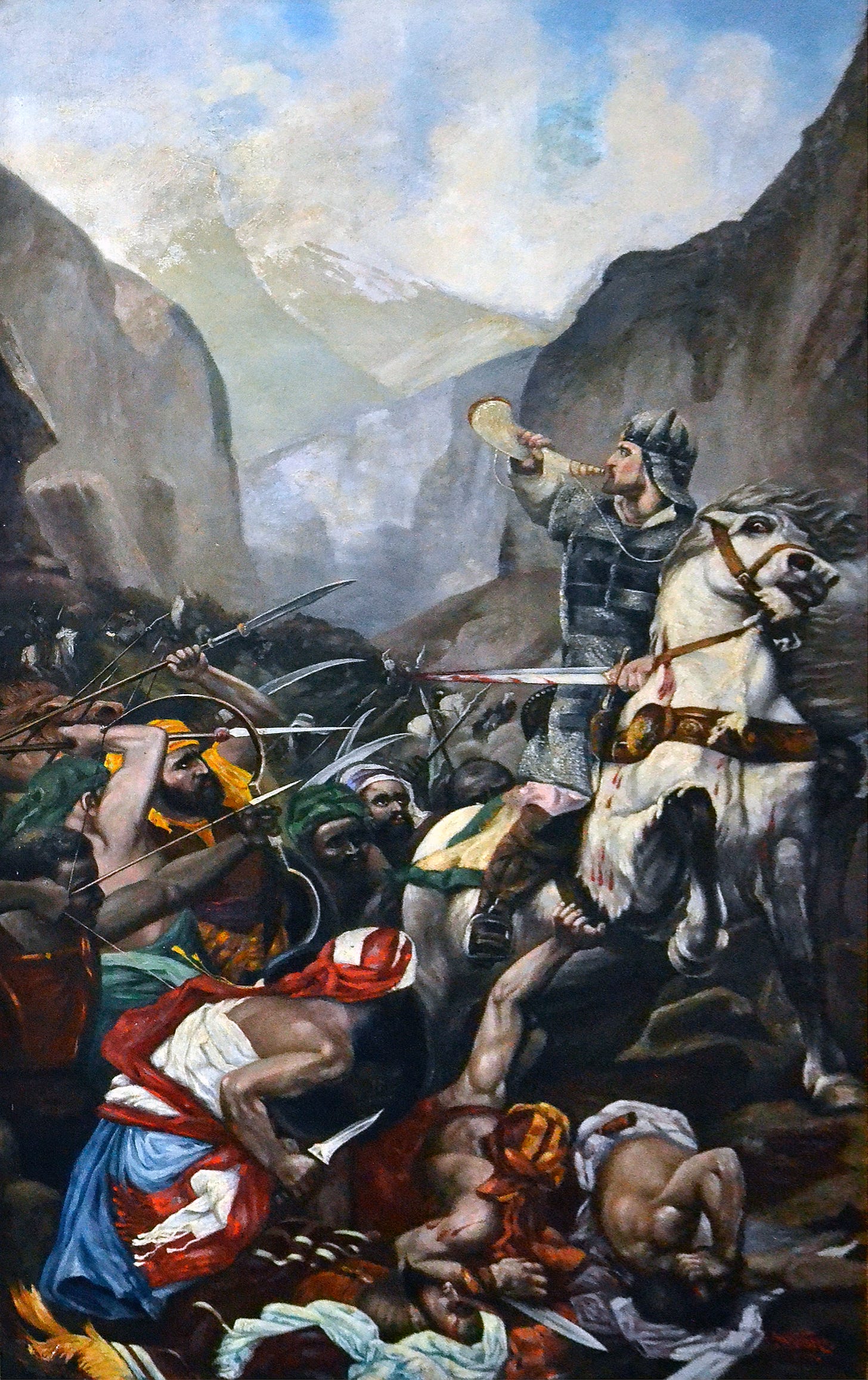On August 15, 778, the army of Charlemagne, King of the Franks, was retreating from a campaign in Spain when his rearguard was ambushed by an army of Basques. Cut off from the main army, the soldiers were cut down to a man, including their commander, Roland.
Even though this would go down in history as one of Charlemagne’s only real defeats during his long reign, it was not until a few centuries later that it inspired one of the most important works of chivalric literature in history. The Song of Roland retold the story of the Battle of Roncevaux Pass as an heroic last stand by the holy paladins against the armies of Islam.
At a climactic moment in the story, Roland refuses to blow his horn to call for aid, thinking it an act of cowardice. By the time he is convinced to do so, it is too late, and by the time Charlemagne arrives there is nothing left to do but exact revenge for the massacre.
Exact historical accuracy has never been the most important part of the stories we have told each other. The point is not to tell the historical record in accuracy and detail, rather to teach a moral truth and set an example for people to live by. The Song of Roland taught generations of French knights what was expected of them —chivalry, honor, selflessness, and courage. It followed in the footsteps of epic poems like The Iliad and The Aeneid which taught Greeks and Romans the values of their cultures.
According to legend, the solders of William the Conqueror sang the Song of Roland as they were marching into battle at Hastings in 1066.
Stories touch a part of ourselves that mere facts do not. You can tell young people to be brave, courageous, or put others above themselves, but those are just words. Stories make those words real.
Our Lord knew, of course, that stories are the doors to the human heart. He often used parables to explain basic truths that his disciples, and Christians through the centuries, needed to understand. One particular parable was recorded in the Gospel of Luke:
“There was a rich man who was clothed in purple and fine linen and who feasted sumptuously every day. And at his gate was laid a poor man named Lazarus, covered with sores, who desired to be fed with what fell from the rich man's table. Moreover, even the dogs came and licked his sores. The poor man died and was carried by the angels to Abraham's side. The rich man also died and was buried, and in Hades, being in torment, he lifted up his eyes and saw Abraham far off and Lazarus at his side. And he called out, ‘Father Abraham, have mercy on me, and send Lazarus to dip the end of his finger in water and cool my tongue, for I am in anguish in this flame.’ But Abraham said, ‘Child, remember that you in your lifetime received your good things, and Lazarus in like manner bad things; but now he is comforted here, and you are in anguish. And besides all this, between us and you a great chasm has been fixed, in order that those who would pass from here to you may not be able, and none may cross from there to us.’ And he said, ‘Then I beg you, father, to send him to my father's house— for I have five brothers—so that he may warn them, lest they also come into this place of torment.’ But Abraham said, ‘They have Moses and the Prophets; let them hear them.’ And he said, ‘No, father Abraham, but if someone goes to them from the dead, they will repent.’ He said to him, ‘If they do not hear Moses and the Prophets, neither will they be convinced if someone should rise from the dead.’”
Luke 16:19-31 ESV
I’ve heard pastors try to draw cosmological truths out of this passage, trying to reconcile the ideas of Hades and Father Abraham with the standard Christian understanding of Heaven, Hell, and the afterlife. I think that misses the point. Christ was using the folk understanding of the afterlife of his day to communicate some deeper truths:
First, worldly success does not necessarily reflect the state of a man’s spirit. It has long been a temptation among Christians going back many centuries to assume that poverty or sickness are symptoms of an ungodly spirit. Even today, prosperity gospel preachers teach that material blessings are a sign of godly hearts.
Second, if someone is so closed off to the truth of Scripture that they refuse to believe in this life, nothing supernatural will convince them either. How many atheists have said in bad faith that if God would simply speak to them, then they would believe?
Explaining parables is akin to explaining jokes in that the explanation lacks the emotional connection of the original story. Who can forget the visceral image of the rich man in such agony that he begged Abraham to allow Lazarus to simply give him one drop of water on his tongue? That kind of imagery ensures that the lessons of the parable are not soon forgotten.
What stories are we telling today? Are we using narratives to teach truth and virtue to our children? What are the messages coming from our books, music, and movies today? Even fictional stories leave marks on the hearts of the readers and listeners. Let us ensure that those marks promote the true and the beautiful, and help us aim to be better versions of ourselves.




